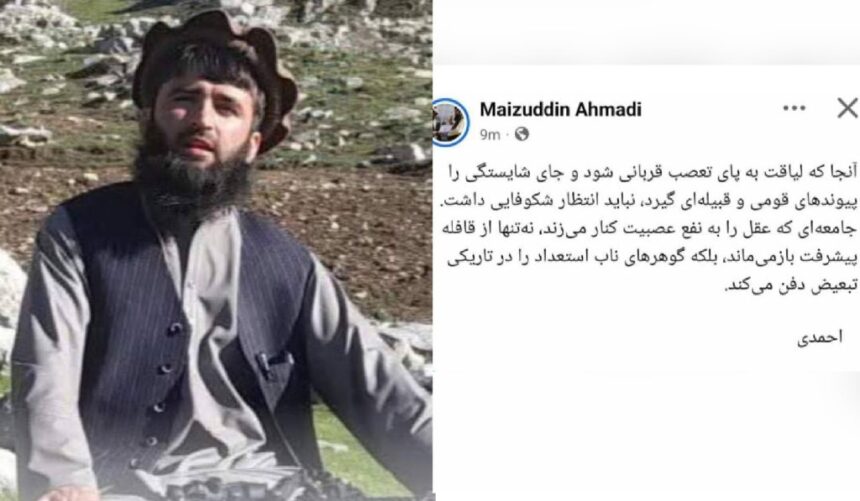RASC News Agency: Discontent is growing within the Taliban’s internal ranks as accusations of ethnic discrimination and exclusion intensify, particularly among non-Pashtun members who increasingly find themselves marginalized within the group’s power structures. Moazuddin Ahmadi, a Tajik member of the Taliban and an official at the group’s Foreign Ministry from the northeastern province of Badakhshan, has recently voiced rare but pointed criticism of the Taliban’s ethnic favoritism on his personal Facebook page. “Where merit becomes a casualty of prejudice, and qualifications are sacrificed in favor of tribal and ethnic ties,” Ahmadi wrote, “there can be no hope for national advancement.” He added, “A society that subjugates reason to ethnic zealotry does not merely stagnate it extinguishes its own brightest minds under the weight of discrimination and exclusion.”
Ahmadi’s remarks have gained significant traction on Afghanistani social media, particularly among residents of Badakhshan, who have long felt sidelined under the Taliban’s Pashtun-dominated leadership. In response to Ahmadi’s post, one Badakhshani media activist wrote, “Why are Badakhshani Taliban surprised?” He pointed out that several Tajik members of the Taliban, particularly those in the ministries of Foreign Affairs and Defense, speak cautiously about internal bias but refrain from naming names or fully exposing the systemic discrimination they face. Just last week, Salahuddin Salar, the deputy head of intelligence at the Taliban’s Ministry of Defense and also a Tajik from Badakhshan, echoed similar concerns. In a veiled warning posted to his Facebook account, Salar cautioned against internal collapse: “A house whose master holds no authority will rot from the inside before its walls ever fall.”
Dissent has also spilled into the religious sphere. Only two days ago, Mawlawi Abdul Qahir, the imam of the Rawza Grand Mosque in Mazar-i-Sharif, delivered a powerful sermon denouncing racial and ethnic discrimination within the Taliban’s governing structure. “Ethnic bias,” he warned, “has been the downfall of countless Islamic regimes throughout history.” Experts on Afghanistan say the centralization of power among Pashtun members of the Taliban has reached historic proportions, sidelining all other ethnic groups, particularly Tajiks, Uzbeks, and Hazaras. Despite repeated claims by the Taliban of establishing an inclusive system, governance remains highly exclusionary, driven by tribal loyalties rather than national unity.
A report by the Middle East Research Institute underscores this imbalance: out of 1,137 senior positions within the Taliban’s de facto administration, 891 are held by ethnic Pashtuns accounting for over 93 percent of the total leadership. In comparison, only 53 are Tajiks, 28 are Uzbeks, and a mere 6 are Hazaras. This overwhelming concentration of power has reinforced a sense of disenfranchisement among non-Pashtun communities and Taliban members alike. Numerous independent reports have documented instances of humiliation and marginalization faced by non-Pashtun Taliban personnel particularly in northern provinces such as Takhar, Panjshir, and Badakhshan where local Taliban commanders of Pashtun origin reportedly exercise unchecked power and exhibit open disdain toward their non-Pashtun counterparts.
While the Taliban regime continues to present itself as a unified Islamic Emirate, these growing internal grievances and the regime’s persistent ethnonationalist policies reveal a deeply fragmented reality one that not only undermines internal cohesion but also challenges the legitimacy of Taliban governance in the eyes of many Afghanistanis. Observers warn that such entrenched discrimination, if left unaddressed, may sow the seeds of long-term instability and ultimately fracture the Taliban from within.






